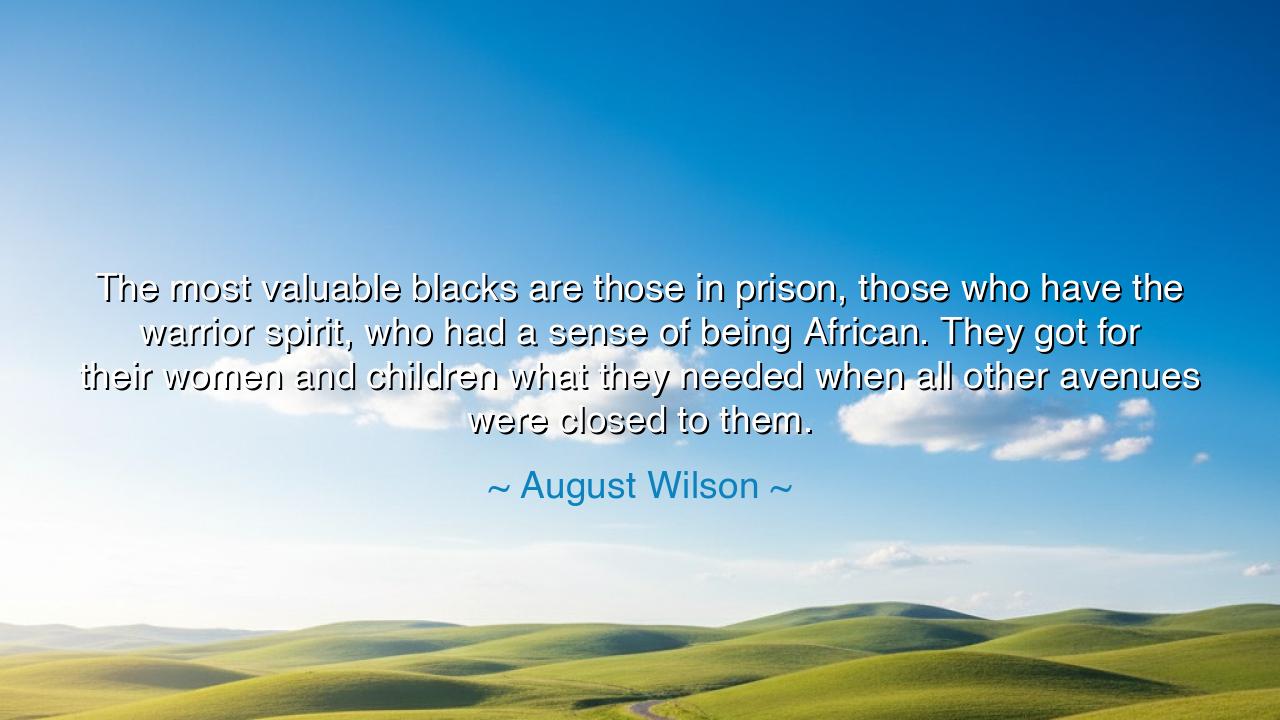
The most valuable blacks are those in prison, those who have the
The most valuable blacks are those in prison, those who have the warrior spirit, who had a sense of being African. They got for their women and children what they needed when all other avenues were closed to them.






The words of August Wilson, keeper of stories and chronicler of a people’s soul, burn with both grief and reverence. When he speaks of the most valuable blacks being those in prison, he does not glorify the cage—he condemns the world that drove the warrior into it. These men, bound in chains, carried the warrior spirit, the ancient memory of being African, protectors of their kin when all lawful doors were barred. Their value is not in their confinement, but in their courage, in their refusal to let their women and children perish when society offered them no bread, no shelter, no justice.
This truth was carved upon the lives of many who walked the ghettos of America in the 20th century. Denied work, stalked by hunger, and pressed beneath the weight of laws that despised them, some men turned to what the world called crime, but what their families knew as survival. To feed their children, they gambled their freedom. To protect their women, they risked their lives. The world judged them; but Wilson saw in them the echo of warriors, ancestors who once stood against chains, whips, and the auction block.
History offers many such examples. Consider Nat Turner, who in 1831 rose with sword and fire against the machinery of slavery. The world named him criminal, rebel, murderer; yet to those in bondage, he was warrior, prophet, deliverer. His uprising was born not of malice, but of the unbearable need to seize dignity when all lawful paths were denied. Though crushed, his spirit lived on in every prisoner who still dreamed of freedom for his people.
Wilson’s vision is not to sanctify suffering, but to reveal the hidden nobility within it. The prison cell, meant to erase dignity, instead became a monument to resilience. Behind bars, the warrior spirit endured, carrying songs, poems, and dreams that nourished the community outside. These men became proof that even when crushed by injustice, the African soul could not be extinguished.
Let the future remember: the measure of a people’s greatness is not written by those who build the prisons, but by those who, even in chains, preserve the fire of their ancestors. For the warrior spirit cannot be caged; it leaps from heart to heart, reminding the children who they are, and calling forth a dawn that no night of oppression can hold forever.






GDGold D.dragon
Wilson’s focus on the 'warrior spirit' and the resilience of Black individuals, especially those in prison, is thought-provoking. It makes me think about the broader social and historical forces that lead to incarceration. Is it fair to romanticize their struggle, or should we focus more on the systems that have failed them? How do we as a society reconcile the value we place on strength and survival with the need to address racial inequalities in a meaningful way?
SQSen Quyen
There’s a lot of weight in August Wilson’s quote, especially with the mention of 'warrior spirit' and the survival instinct of Black individuals in dire situations. But I’m curious—how does society truly benefit from acknowledging this warrior spirit? Should we be emphasizing the strength of these individuals as a way to understand the larger systemic issues at play, or is there a risk of romanticizing the hardship rather than addressing the root causes of injustice?
TBThu Bao
Wilson’s quote highlights a tough, complex reality. It feels like he’s reflecting on how certain Black individuals, especially those who’ve been incarcerated, are often overlooked in terms of their potential and value. I find myself asking, though—what does it say about society when those who are considered the most valuable are those who’ve faced the harshest challenges? Does this reveal a deeper issue with how we define success and worth in the context of race?
VALuong Viet Anh
I’m deeply moved by August Wilson’s perspective, particularly the idea that the warrior spirit among Black men in prison holds value. But what does this suggest about the role of society in shaping who these individuals become? Are we failing to recognize their worth outside of prison? Can we shift the conversation from viewing incarcerated Black individuals as solely products of a broken system to appreciating their strength and resilience as well?
TNNguyen thu Ngan
Wilson’s words make me think about how society often views certain groups of people, particularly Black men, as expendable, yet there is a depth to their experiences that is rarely acknowledged. What does he mean by the 'warrior spirit'? Is it about survival, pride, or something else entirely? I’m curious about how we can better understand and value the struggles and strength of Black individuals, especially those in the criminal justice system.